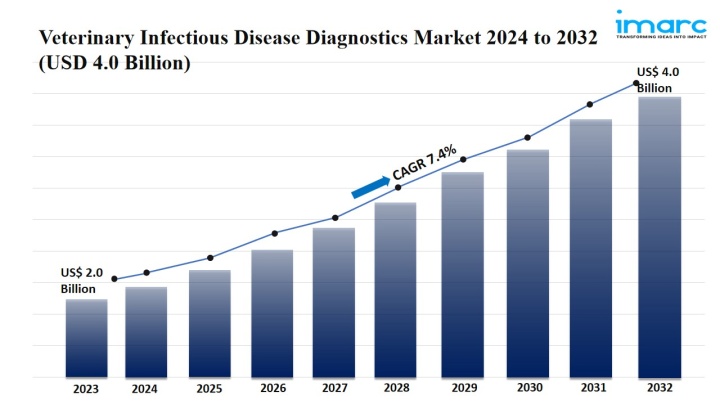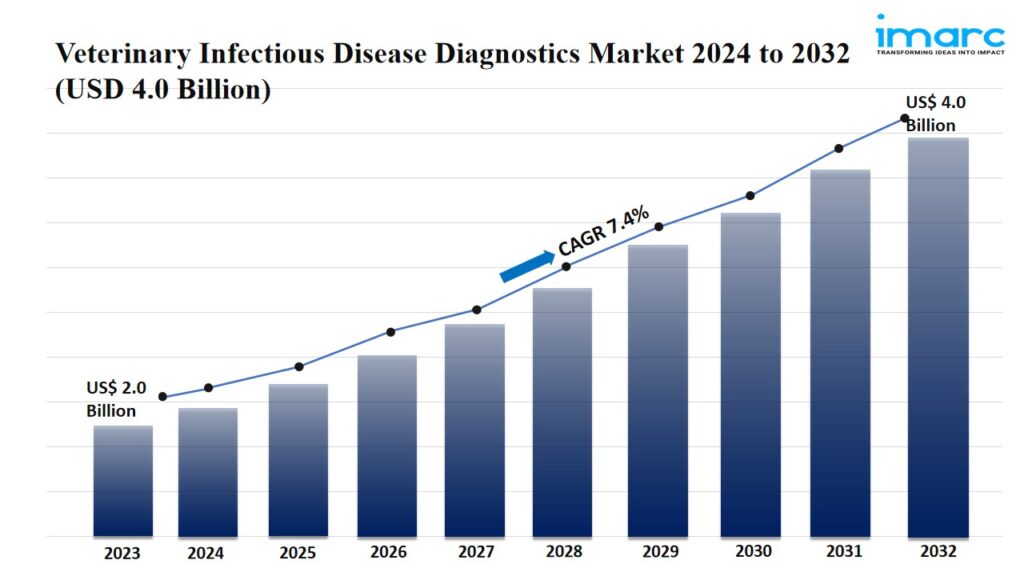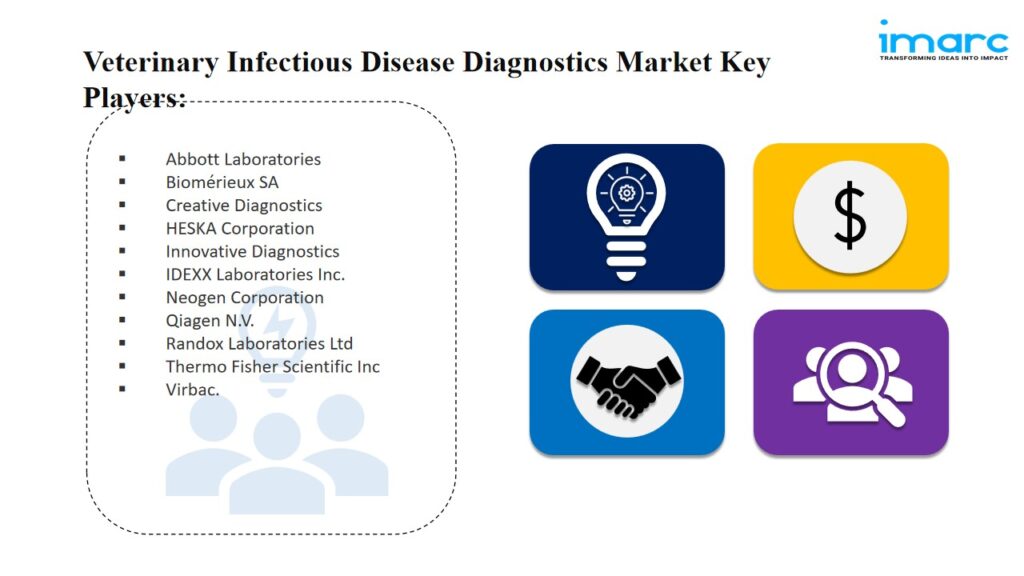

IMARC Group’s report titled “Veterinary Infectious Disease Diagnostics Market Report by Technology (Immunodiagnostics, Molecular Diagnostics, and Others), Animal Type (Companion Animals, Food Producing Animals), Infection Type (Bacterial Infections, Viral Infections, Parasitic Infections, and Others), End User (Reference Laboratories, Veterinary Laboratories and Clinics, Point of Care/In House Testing, Research Institutes and Universities), and Region 2024-2032“. The global veterinary infectious disease diagnostics market size reached US$ 2.0 Billion in 2023. Looking forward, IMARC Group expects the market to reach US$ 4.0 Billion by 2032, exhibiting a growth rate (CAGR) of 7.4% during 2024-2032.

For an in-depth analysis, you can refer sample copy of the report: https://www.imarcgroup.com/veterinary-infectious-disease-diagnostics-market/requestsample
Factors Affecting the Growth of the Veterinary Infectious Disease Diagnostics Industry:
Pet parents are increasingly seeking routine health checks for their pets, which include diagnostic tests to ensure early detection of diseases. There’s a growing trend of preventive healthcare for pets, involving regular vaccinations and diagnostic tests to monitor and prevent infectious diseases. Pet parents are more willing to spend on high-quality healthcare for their pets, including advanced diagnostic tests, contributing to market growth. The rise in pet insurance coverage allows more pet parents to afford comprehensive diagnostic and treatment options, thereby boosting the demand for diagnostic services.
Techniques, such as polymerase chain reaction (PCR) and real-time PCR (RT-PCR) allow for the precise detection of pathogens at the genetic level. These methods are highly sensitive and can detect low levels of infectious agents, improving early diagnosis and treatment outcomes. NGS enables comprehensive genomic analysis of pathogens, helping in the identification of new and emerging infectious diseases, and understanding their transmission patterns and resistance mechanisms.
The growing prevalence of infectious diseases in animals necessitates early detection and diagnosis to prevent widespread outbreaks. This drives the demand for advanced diagnostic tools and technologies that can identify diseases at an early stage. Regular diagnostic testing becomes essential to monitor animal health and implement preventive measures before diseases become severe or widespread. Governments and health organizations are implementing more robust surveillance programs to monitor and control the spread of infectious diseases in animals. These programs rely heavily on accurate and efficient diagnostic tools.
Leading Companies Operating in the Global Veterinary Infectious Disease Diagnostics Industry:

Veterinary Infectious Disease Diagnostics Market Report Segmentation:
By Technology:
Immunodiagnostics represent the largest segment due to their high specificity, sensitivity, and ability to detect a broad range of infectious agents rapidly and accurately.
By Animal Type:
Companion animals account for the majority of the market share owing to the increasing pet ownership and spending on pet healthcare.
By Infection Type:
Bacterial infections exhibit a clear dominance in the market as bacterial infections are common and often require precise and rapid diagnostics to ensure effective treatment and control.
By End User:
Reference laboratories hold the biggest market share. Reference laboratories are equipped with advanced diagnostic technologies and handle a large volume of complex tests, providing reliable and comprehensive diagnostic services.
Regional Insights:
North America enjoys the leading position in the veterinary infectious disease diagnostics market on account of its well-established veterinary healthcare infrastructure, high pet ownership rates, and significant investment in advanced diagnostic technologies.
Global Veterinary Infectious Disease Diagnostics Market Trends:
The adoption of advanced molecular diagnostic techniques, such as PCR and next-generation sequencing, is increasing due to their high accuracy and ability to detect a wide range of pathogens. There is a growing preference for point-of-care (POC) diagnostic devices, which offer rapid results and facilitate immediate decision-making in both clinical and field settings. The rising incidence of zoonotic diseases, which can be transmitted from animals to humans, is driving demand for veterinary diagnostics to prevent and control potential outbreaks that could affect public health.
Note: If you need specific information that is not currently within the scope of the report, we will provide it to you as a part of the customization.
About Us:
IMARC Group is a leading market research company that offers management strategy and market research worldwide. We partner with clients in all sectors and regions to identify their highest-value opportunities, address their most critical challenges, and transform their businesses.
IMARCs information products include major market, scientific, economic and technological developments for business leaders in pharmaceutical, industrial, and high technology organizations. Market forecasts and industry analysis for biotechnology, advanced materials, pharmaceuticals, food and beverage, travel and tourism, nanotechnology and novel processing methods are at the top of the companys expertise.
Our offerings include comprehensive market intelligence in the form of research reports, production cost reports, feasibility studies, and consulting services. Our team, which includes experienced researchers and analysts from various industries, is dedicated to providing high-quality data and insights to our clientele, ranging from small and medium businesses to Fortune 1000 corporations.
Contact Us:
IMARC Group
134 N 4th St. Brooklyn, NY 11249, USA
Email: sales@imarcgroup.com
Tel No:(D) +91 120 433 0800
United States: +1-631-791-1145
